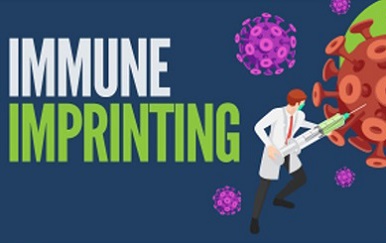BREAKING COVID-19 News! University Of Washington Study Warns That New Monovalent XBB.1.5 COVID-19 Vaccine Causes Persistent Immune Imprinting!
Nikhil Prasad Fact checked by:Thailand Medical News Team Dec 01, 2023 2 years, 2 months, 3 weeks, 2 days, 21 hours, 35 minutes ago
COVID-19 News: In a significant breakthrough, the University of Washington in Seattle, USA, has conducted a groundbreaking study shedding light on the intricate dynamics of immune responses following the administration of the latest monovalent XBB.1.5 COVID-19 vaccine. This research, published in this
COVID-19 News report, delves into the phenomenon of immune imprinting, revealing crucial details about the persistent effects of previous exposures on the body's immune system.
 Understanding Immune Imprinting
Understanding Immune Imprinting
The term "immune imprinting," or original antigenic sin, refers to how the initial exposure to a virus shapes the subsequent immune responses to related strains. The study centered its focus on individuals experiencing SARS-CoV-2 Omicron breakthrough infections and those who received bivalent COVID-19 vaccination. Surprisingly, the research discovered a strong immune imprinting effect, primarily recalling cross-reactive memory B cells and antibodies induced by prior mRNA vaccination with the Wuhan-Hu-1 spike. This phenomenon took precedence over priming naive B cells specific to Omicron-specific epitopes.
Challenges of Immune Imprinting
As the SARS-CoV-2 virus continues to evolve, immune evasive variants have posed considerable challenges to the effectiveness of existing COVID-19 vaccines. In response to this, two updated vaccine boosters were developed: a bivalent Wuhan-Hu1/BA.5 spike mRNA booster and a monovalent XBB.1.5 S mRNA booster. However, the study suggests a cautionary note - the XBB.1.5 booster may not entirely overcome immune imprinting, thus emphasizing the need for careful considerations in designing future vaccine boosters.
Neutralizing Antibody Responses
Neutralizing antibodies are pivotal in conferring protection against COVID-19, and their levels were meticulously evaluated following the administration of the XBB.1.5 S mRNA vaccine booster. Researchers collected plasma from individuals with a history of multiple vaccine doses, with or without known infection. Astonishingly, the XBB.1.5 booster elicited robust neutralizing antibody responses against current variants, predominantly recalling pre-existing memory B cells induced by the Wuhan-Hu-1 spike.
Vaccine Mismatch and Immune Imprinting
A noteworthy finding from the study was the higher plasma neutralizing activity against the Wuhan-Hu-1/D614G S VSV (vaccine-mismatched) relative to the XBB.1.5 S VSV (vaccine-matched). This intriguing observation suggests that XBB.1.5 S vaccination increased cross-reactive plasma antibody titers previously elicited by Wuhan-Hu-1 S exposure. The study argues that this poses a challenge for inducing de novo antibody responses against XBB.1.5 S, emphasizing the complexity of immune imprinting.
Memory B Cell Analysis
To further unravel the intricacies of immune responses, researchers analyzed memory B cell populations in individuals who received the XBB.1.5 S mRNA vaccine booster. The data indicated that XBB.1.5 S vaccination predominantly recalled pre-existing memory B cells induced by Wuhan-Hu
-1 S vaccination. Only a limited fraction of individuals exhibited memory B cells recognizing the XBB.1.5 RBD but not the Wuhan-Hu-1 RBD, indicating the difficulty in inducing de novo responses against the new variant. These findings align with observations made post-Omicron breakthrough infections and the introduction of bivalent Wuhan-Hu-1/BA.5 vaccine boosters.
Implications for Future Vaccine Design
In conclusion, the study underscores the persistent nature of immune imprinting induced by the XBB.1.5 COVID-19 vaccine, even after multiple exposures to Omicron spikes through vaccination and infection. The dominance of pre-existing memory B cells induced by Wuhan-Hu-1 S exposure poses substantial challenges for the design of future vaccine boosters. As SARS-CoV-2 S-specific memory B cells continue to evolve over time, the long-term impact of immune imprinting remains a critical area for further investigation.
The implications of this study are significant for researchers and vaccine developers grappling with the evolving landscape of the COVID-19 pandemic. The intricate dynamics of immune responses, particularly in the context of emerging variants and persistent immune imprinting, necessitate a nuanced approach to vaccine design. As we navigate through the complexities of this global health crisis, these findings will undoubtedly play a pivotal role in shaping future strategies and interventions.
The study findings were published on a preprint server and are currently being peer reviewed.
https://www.biorxiv.org/content/10.1101/2023.11.28.569129v1
For the latest
COVID-19 News, keep on logging to Thailand Medical News.
